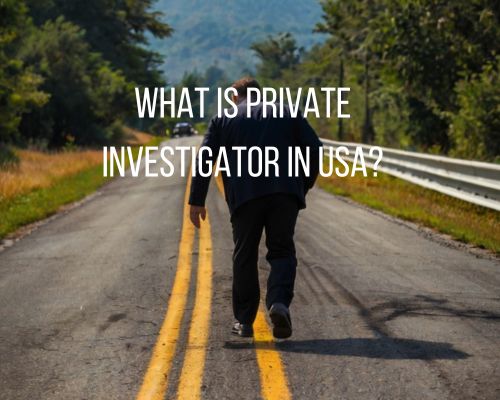
What is a Private Investigator in USA:
Definition and Roles
Private investigators like in Ali Private Investigator Tampa are professionals who are hired by individuals, attorneys, or corporations to gather information about people, businesses, groups, or locations. They are trained to conduct surveillance, research, and investigations to uncover information that may be difficult or impossible to obtain by other means.
In the United States, private investigators are regulated by state laws and must follow strict rules and regulations to avoid breaking local or state laws and causing undue harm to the subjects that are under investigation.

To become a private investigator in the USA, you must have a high school diploma or equivalent. In some states, you may need to have a college degree or specific training in criminal justice or related fields.
You also need to obtain a license from the state in which you plan to work. The requirements for obtaining a license vary by state, but generally, you need to pass a background check, complete a training program, and pass an exam.
Private investigators may work for private investigation firms, law enforcement agencies, or be self-employed. They may specialize in a particular area of investigation, such as fraud, infidelity, or missing persons.
Private investigators may work irregular hours and may need to travel frequently to conduct investigations. They must be skilled in gathering and analyzing information, interviewing witnesses, and presenting evidence in court if necessary.
Understanding the Role of a Private Investigator in the USA
Private investigators (PIs) are professionals who provide investigative services to individuals, businesses, and organizations. Their role revolves around conducting investigations, gathering information, uncovering evidence, and providing detailed reports on a wide range of matters.
PIs are usually hired to investigate cases related to fraud, criminal activity, missing persons, and other similar cases. If you are looking for one, see Ali Private Investigator Tampa.
Definition and Scope of Work
Private investigators are licensed professionals who are trained to provide investigative services to their clients. They work in the field of investigations and are responsible for gathering information, conducting surveillance, and providing evidence to their clients.
The scope of work of a private investigator includes conducting background checks, interviewing witnesses, and conducting surveillance on individuals or groups.
Typical Duties and Tasks
The typical duties and tasks of a private investigator include conducting investigations, gathering information, conducting surveillance, and providing detailed reports to their clients. They may also be responsible for conducting background checks, interviewing witnesses, and gathering evidence.
Private investigators must also communicate effectively with their clients and provide regular updates on the progress of their investigations.
Skills and Attributes for Success
To be successful as a private investigator, you need to have excellent communication skills, patience, attention to detail, problem-solving skills, and decision-making skills.
You must also have a strong work ethic, be reliable, and have the ability to work independently.
Private investigators must also be discreet and maintain confidentiality while conducting their investigations.
Becoming a Private Investigator
If you are interested in becoming a private investigator in the USA, there are certain educational, legal, and work experience requirements that you must meet. In this section, we will discuss the various requirements and steps you need to take to become a private investigator.
Educational and Training Requirements
Most private investigators are required to have a high school diploma or equivalent. However, some employers may prefer or require you to have an associate or bachelor’s degree in criminal justice or a related field.
You can also attend classes or obtain a degree to gain the necessary knowledge and skills to become a private investigator.
Licensing and Legal Requirements
Becoming a licensed private investigator is a legal requirement in most states. The licensing requirements vary by state, but most states require you to meet certain age, education, and experience requirements.
You may also be required to pass a background check and an exam to obtain a private investigator license.
Employment and Work Environment
Private investigators can work for law enforcement agencies, military organizations, or private investigation firms. They can also work as self-employed investigators.
The work environment can vary depending on the type of investigation you are conducting. Some investigations may require you to work in an office, while others may require you to work in the field.
According to the U.S. Bureau of Labor Statistics, the job outlook for private investigators is expected to grow 8% between 2018 and 2028. The median annual salary for private investigators is $52,120 per year. However, the salary can vary depending on your experience, education, industry, and licensure.
The top-paid investigators can make $70,650 or more, while the lowest-paid 10% of investigators make $32,000 a year.
In summary, becoming a private investigator in the USA requires you to meet certain educational, legal, and work experience requirements. You must obtain a private investigator license, which requires you to pass an exam and meet other state licensing requirements. The job outlook for private investigators is positive, and the salary can vary depending on your experience, education, and licensure.